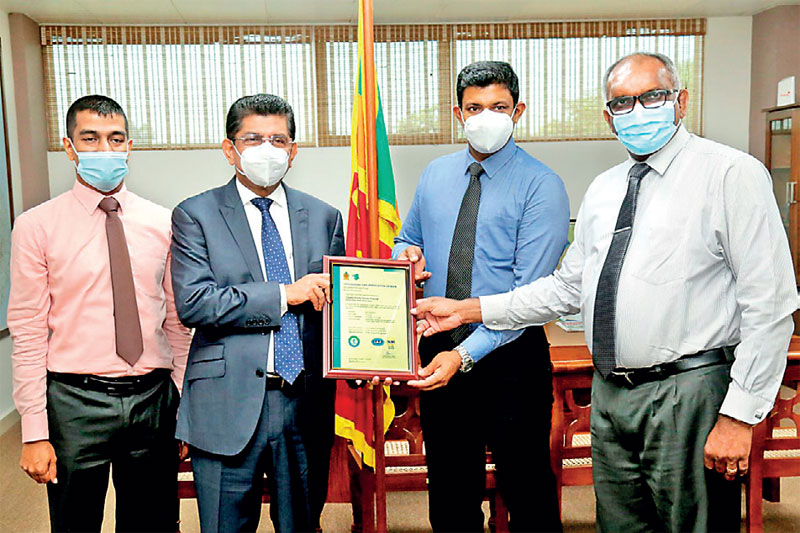Sunday Feb 22, 2026
Sunday Feb 22, 2026
Thursday, 6 January 2022 02:28 - - {{hitsCtrl.values.hits}}

From left: Sri Lanka Climate Fund CEO Chamara Ariyathilaka, Ministry of Environment Secretary Dr. Anil Jasinghe, Cargills Quality Dairies and Kotmale Dairy Products Managing Director Saranga Wijesundara, and Dairy Sector Group Manager Manufacturing Nimal Gunarathna
Kotmale Dairy Products and Cargills Quality Dairies, subsidiaries of Cargills, have become the first dairy companies in Sri Lanka to complete a carbon footprint verification.
The verifications are conducted by the Sri Lanka Climate Fund under the purview of the Ministry of Environment. Both companies undertook a voluntary assessment of their carbon footprint and have successfully completed their greenhouse gas emissions assessment for the year 2020.
The carbon footprint verification will help both companies gauge their current environmental impact and set targets to systematically reduce greenhouse gas emissions with a view to becoming carbon neutral in the future.
The Cargills dairy sector has multiple sustainability initiatives taking place across its operations at the moment. The Cargills Quality Dairies factory in Banduragoda, the largest integrated dairy facility in Sri Lanka, has 1.4 MW of solar energy generating capacity which saves the equivalent of 35,000 kg of carbon dioxide emissions every year. To improve biodiversity in the surrounding area of the factory, the company has established an environmental buffer zone with over 2,000 trees. The factory’s central refrigeration process has a minimal impact on the environment, as it uses a gas with the highest refrigeration efficiency (COP). Its Ozone Depletion Potential (ODP) and Global Warming Potential (GWP) are also considered to be zero.
The company also has a strong water management and waste management system at its factory premises. Rainwater is harvested and used for cooling purposes while wastewater from the factory is treated through reverse osmosis and used for cooling systems. Around 95% of all waste from its operations are recycled. Waste plastic generated from the production process is sent to be converted into plastic modified asphalt concrete (PMAC) which is then used as the key raw material to pave the plastic car park project carried out by Cargills Food City. By doing so it provides an end use to non-recyclable plastic material which would otherwise find its way to landfills or incineration.
The company has introduced environmentally friendly packaging for its products including the Magic Heavenly range ice cream tubs, Kotmale cheese wedges, and the Kotmale yoghurt to reduce its plastic consumption. The Kotmale yoghurt paper spoons are made of biodegradable material, which significantly reduces the amount of plastic used in the manufacturing process.
The company’s sustainability measures go beyond protecting the environment. As a leading dairy company in the country, Kotmale and Cargills Quality Dairies have made significant investments in dairy development, supporting smallholder farmers by providing them with cattle sheds, milking machines, grass cutting equipment, etc. The company also provides technical assistance to its dairy farmer network and supports them with cattle feed cultivation.
Through dairy development, the company hopes to increase fresh milk production in Sri Lanka and improve the incomes of dairy farmers. The company recently invested in model dairy farms, with the goal of increasing the milk yield among its farmer network by promoting better nutrition and care for the animals as well as better farm management practices. The company plans to encourage more farmers to emulate this concept and help them set up high productivity dairy farms.
Kotmale Dairy Products and Cargills Quality Dairies together are the largest private sector fresh milk collectors in Sri Lanka. They collect on average 180,000 litres of fresh milk every day from over 17,000 smallholder dairy farmers spread across the island.